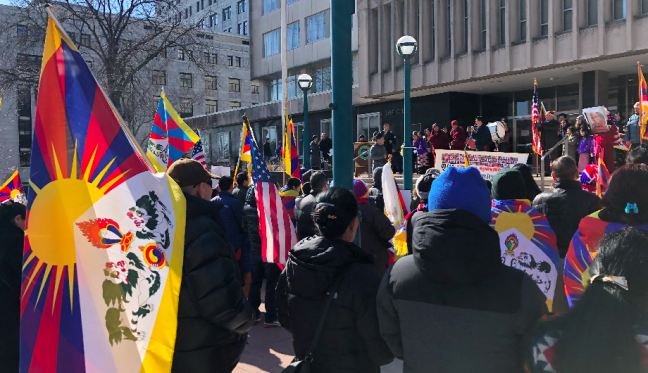Tibetan leaders, students, supporters and state political leaders gathered on the steps of the City County Building Saturday to honor the lives of Tibetans who lost their lives in the uprising against the Chinese government 59 years ago and to protest ongoing human rights violations in Tibet.
On March 10, 1959 in Lhasa, Tibet, thousands of unarmed citizens formed a “massive human chain” around the summer palace of the Dalai Lama in opposition to an invading Chinese military, according to a statement given by Kashag of the Central Tibetan Administration. In suppressing the uprising and occupying Tibet, the Chinese military killed thousands of peacefully demonstrating Tibetans, forcing the Dalai Lama to flee to India.
Since the uprising, the Chinese government has continued to repress and assault Tibetan religion and culture, president of the Wisconsin Tibetan Association Lobsang Tenzin said. For example, China has made it illegal for Tibetans to pray to the Dalai Lama or possess a Tibetan flag.
“For more than half a century, Tibetans within Tibet have continued to suffer unimaginable hardship and torture under the Chinese law,” Tenzin said.
Since 2009, 151 Tibetans have self-immolated in protest of Chinese occupation, according to Kashag. On March 7, 2018, Tsekho Tugchak, a Tibetan man in his forties, self-immolated in Eastern Tibet.
The Dalai Lama has advocated for the “middle-way approach” — a compromise between total independence of Tibet and its present status under the control of China — to resolve the conflict between Tibet and China, Tenzin said. Tenzin and other speakers at the event called on China to initiate good-faith negotiations with Tibet.
“China’s government must resume a dialogue with our special employ of His Holiness … dialogue and negotiation is key to maintaining peace in this 21st century,” Tenzin said. “I call on every freedom-loving people to support the Tibetan movement which calls for basic rights in one’s own land.”
In recognition of Tibet Day, established by the Wisconsin State Legislature in 1997, and Tibetan National Uprising Day, Wisconsin political leaders joined Tibetan speakers to advocate and show solidarity for a free Tibet.
Dane County Executive Joe Parisi compared his support for the Tibetan community to the Tibetan “endless knot,” which symbolizes the lack of beginnings, ends and differences between people.
“Were all here to stand with you today and tell you that we are one with you and we will stick with you until the end,” Parisi said.


